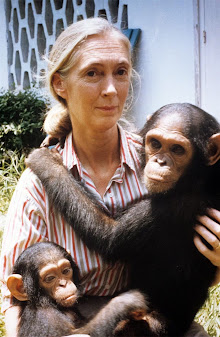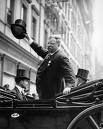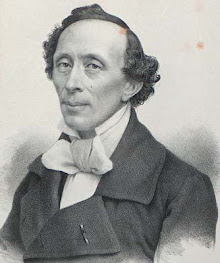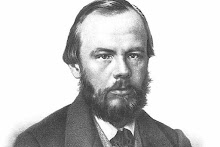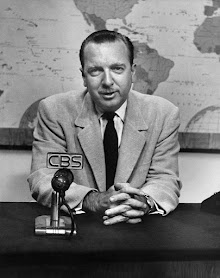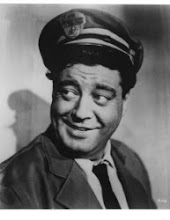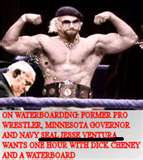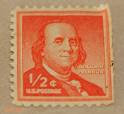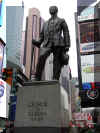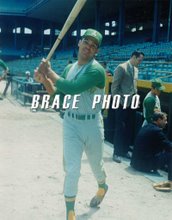Late fifties TV shows depicted family life as sterile and wholesome with dilemmas of minor consequence mixed in. Sit-coms like "OZZIE AND HARRIET" and "FATHER KNOWS BEST" typified this notion. However, I would expect that few TV viewers actually bought-in to the idea of housewives cleaning and cooking in beautiful dresses and high-heels. Or, that husbands, after a hard day at the office were taking off their suit's sports coat (while leaving their ties on) as they straightened-out the day's travails, in a smoking jacket.
When I was little, I didn't need to be Einstein to figure out that real-life families were different from TV. I only had to look outside daily, to see our impatient neighbor encouraging his dalmatian to do its business quickly by clearly enunciating to the world, the entire contents of the profanity handbook. Across the street, we had the head-shaved guy we kids called Mr. Clean. He seemingly wore his wife-beater tee-shirt outside everyday, even to shovel snow. A few doors further down George, from the filling station, came by a couple of times a week to visit his friend. After a while you'd think he'd realize that his friend was at work during the day and that his friend's wife was alone in the house...I wonder what they were talking about? Nevertheless, the most intriguing and most dysfunctional family on our street featured a dad, mom and son. Let's call them the Cleavers.
 The father (I'll call him Ward) was the root of the Cleaver's downfall. An austere accountant, he walked drearily home like clockwork at 6:30. Expressionless, in a black suit and black fedora, he carried a black cloth briefcase in one hand and a black umbrella (rain or shine) in the other. This Willy Loman-like figure never acknowledged the kids on the street and never looked our way either.
The father (I'll call him Ward) was the root of the Cleaver's downfall. An austere accountant, he walked drearily home like clockwork at 6:30. Expressionless, in a black suit and black fedora, he carried a black cloth briefcase in one hand and a black umbrella (rain or shine) in the other. This Willy Loman-like figure never acknowledged the kids on the street and never looked our way either.My father used to make "Ward" jokes to my mother. Dad would say that Mr. Cleaver was giving her "the eye," (checking her out). This was made "funnier" because the gossip going around was that Ward was a monster who was no stranger to smacking his wife (I'll call her June) around. June frequently wore giant sun-glasses and/or gobbed-on plenty of make-up to hide her pummeled face.
June was certainly oppressed and Ward, in addition to being a tyrant was especially cheap.
Back around 1960, in many households the husband handled all the money matters. The Cleavers were one such family. June, because Ward was so thrifty...never had any "mad-money" until she developed this scheme:
Back around 1960, in many households the husband handled all the money matters. The Cleavers were one such family. June, because Ward was so thrifty...never had any "mad-money" until she developed this scheme:
In a rotation of housewives that included my mother, June would come by and ask if there was anything she could pick up for them at the market. At a time when a can of corn was probably 15c, her subterfuge rarely amounted to more than a dollar at a time. The selected neighbor would give her the money thus "padding" the Cleaver grocery order. When Ward came home, he'd check the supermarket receipt total and take back the exact change from June. This allowed June to pocket the pittance from what she picked up for the neighbor.
Please remember, Ward was an accountant. At some point, even though 1960-era cashier register tapes only showed prices, Ward, perhaps during a spot-check, itemized the list against the newly bought goods and discovered the discrepancy. At about that time, June accidentally walked into a door. She broke her jaw and never asked to go shopping for neighbors any more.
June and Ward had one son, Beaver. He was four years older than me and a nice guy. Once when I was around ten, he climbed a tree to free my friend's kite. Several other times he stopped to throw a ball with us. In my early teenage years Beaver began ignoring us. At about that time, I saw him hanging-out in the parking lot of a closed strip mall with "hitters" (outside Brooklyn most people call these trouble-makers, Greasers).
One afternoon my friends and I saw Beaver lurch out his front door and fall on the lawn. We ran over and thought he was sick. He laid motionless and stared directly at the sun. Suddenly, he began to shake. His convulsing got worse and he muttered incoherently. A woman looked out her window and saw our crowd watching him "trip." She rushed outside and ushered us away. Down the block, we occupied ourselves for a while until we heard the police sirens and the ambulance.
The next (and last time) I saw Beaver, we were playing stickball in front of the Cleaver's house. Ward was watering the garden and Beaver was stumbling up the street. He confronted his father and a violent argument ensued...until Beaver pulled a gun. He led his father into the house and after a few minutes, Beaver ran out, threw the gun into the bushes and fled. We could hear June screaming before she and Ward came out. June was hysterically crying as Ward set-out after Beaver...his chase lasted to the corner and he gave up.
I'm going to see my mother later this week and I'm going to tell her she was wrong to say, she was lucky to have such good kids...because it's the other way around.
With that in mind, remember, its never too early to get ready for MOTHER'S DAY.

 It then
It then  During that first game, Fukudome had three hits including a dramatic ninth inning three-run home run that sent the game into extra innings.
During that first game, Fukudome had three hits including a dramatic ninth inning three-run home run that sent the game into extra innings.  To further illustrate the newness of the concept of women running, jumping, sweating and chasing a basketball, many women's college programs back then were still offering a "girls" half-court version of the game. Among other tweaks in the rules, try to imagine playing basketball with each player restricted to three dribbles at a time.
To further illustrate the newness of the concept of women running, jumping, sweating and chasing a basketball, many women's college programs back then were still offering a "girls" half-court version of the game. Among other tweaks in the rules, try to imagine playing basketball with each player restricted to three dribbles at a time.







